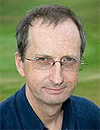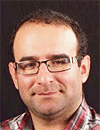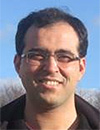Noisy knees
The Project Team

Professor John Goodacre MD PhD FRCP
Role in the Noisy Knees Study: Chief Investigator
John was one of the first graduates in Medicine from Nottingham University. After completing his clinical training and obtaining MD and PhD degrees at Newcastle University he established and led a successful biomedical research team to study molecular mechanisms and treatments for arthritis and other autoimmune conditions. He was then appointed as Director of Clinical Research at the Lancashire School of Health and Postgraduate Medicine before taking up his current appointment at Lancaster University in 2008.
John is Professor of Musculoskeletal Science in the Faculty of Health and Medicine at Lancaster University, and Honorary Consultant in Rheumatology at the Blackpool Teaching Hospitals NHS Foundation Trust. He undertakes a variety of advisory and leadership roles for the NIHR, as well as for UK and EU research councils and medical research charities.
Since January 2014 he has been Medical Director of the North West Coast Academic Health Science Network (NWC AHSN), one of 15 AHSNs recently established by NHS England to increase the scope, scale, development and uptake of Innovation by the NHS.
John leads Lancaster University's programme of knowledge exchange in Health and Medicine. This involves identifying and developing strategic partnerships with public and private sector organisations for research, innovation and professional development across many fields of Health and Medicine. Within this role, he is Director of the Lancaster Health Hub, a partnership established in 2010 between Lancaster University, six local NHS Trusts and the University of Cumbria.

Professor Lik-Kwan Shark
Role in the Noisy Knees Study: Signal Processing Lead
Lik-Kwan is the founder and head of the Applied Digital Signal and Image Processing Research Centre (ADSIP) and the Advanced Digital Manufacturing Technology Research Centre (ADMT) at the University of Central Lancashire (UCLan). He is a fellow of IET and holds a number of honorary positions which include Visiting Professor of Lancaster University. Working with an extensive network of collaborators in various sectors, he has received over £9M external funding, produced over 150 publications and won several awards for his research in novel applications of digital signal and image processing technologies, from non-destructive evaluation of aerostructures to non-invasive diagnosis of medical conditions.

Professor Peter Diggle
Role in the Noisy Knees Study: Lead Statistician
My research concerns the development and application of statistical methods relevant to the biomedical and health sciences. In addition to my substantive post in the Lancaster Medical School, I hold a part-time post at the University of Liverpool Department of Epidemiology and Population Health and adjunct appointments at the Johns Hopkins University School of Public Health, Columbia University International Research Institute for Climate and Society, and Yale University School of Public Health. I am a trustee for the Biometrika Trust, a member of the Advisory Board for the journal Biostatistics, chair of the Medical Research Council's Strategic Skills Fellowship Panel and President of the Royal Statistical Society.

Professor John Waterton
Role in the Noisy Knees Study: Validation Expert
John Waterton (University of Manchester) has many years' experience in measuring biomedical signals and images (e.g. knee MRI), and turning these measurements into validated "biomarkers" which can then be used to help medical research and patient care. John Waterton provides general advice to the team on validation.

Dr Daniela Katrin Schlueter
Role in the Noisy Knees Study: Statistician
I did my degree in Biomathematics in Germany. During this I also spent some time studying in New Zealand and Dundee where I wrote my final project. I then stayed in Dundee for my PhD which was on mathematical modelling of cell migration and cancer cell invasion. At the end of this I wanted to move more towards statistical modelling and statistics in order to be closer to real life applications and be able to work with patient data. Therefore I did a postdoc in pharmacokinetics at Cranfield University which allowed me to learn a lot about statistical modelling techniques.

Dr Mandy Dixon
Role in the Noisy Knees Study: Project Manager
Mandy is Manager of the Lancaster Health Hub. Mandy is originally from South Africa where she worked for the Medical Research Council. After moving to the UK in 1994, Mandy spent several years in research management roles within the Universities sector and the NHS, including the post of Research & Development Manager for a Birmingham based NHS Trust. She has a PhD in applied health research and has gained extensive experience of cross-sectoral working across NHS and academic environments, including comprehensive knowledge of research and funding landscapes. Mandy co-ordinates and supports the Hub's strategic and operational outreach activities.

Jane Huddleston
Role in the Noisy Knees Study: Clinical Study Coordinator
Jane has worked in the pharmaceutical industry and across many organisations in the NHS within the areas of service development and research. Most recently working as a Research Grants Officer, she has been involved in many dynamic research teams across Lancashire working with early stage ideas and grant applications. Jane has a Biomedicine degree and Masters in Health Research from Lancaster University. This education, and experience of early stage research ideas and teams, ethics applications and good organisational skills help Jane in the role of Clinical Study Coordinator in the Noisy Knees study.

Lucy Spain
Role in the Noisy Knees Study: Clinical Research Technician
Lucy has a background in Biomedical Science, with experience in both basic science and clinical research. Her research interests lie in the musculoskeletal system and she is currently finishing her PhD which has been focused on a clinical study into osteoporosis. Her PhD project spanned Medicine and Engineering, two disciplines which are closely linked within the noisy knees project.

Janet Rigby
Role in the Noisy Knees Study: Research Practitioner
Janet is originally from London, where she obtained a degree in Life Sciences from Imperial College before training as a nurse at St George's Hospital. She worked for many years as a nurse, in both England and Scotland, completing a MMedSci degree at Sheffield University before moving to Lancaster to undertake a part time PhD. She is working part-time as a Research Practitioner for the Noisy Knees project, assisting with staff training and data collection.

Dr Bashar Rajoub
Role in the Noisy Knees Study: Research Associate
Bashar was a member in the Vision Graphics and Visualisation Group at Aberystwyth University and recently moved to the University of Central Lancashire to join the Centre for Applied Digital Signal and Image Processing. His research interests include image understanding and analysis, biomedical engineering, digital signal/image processing, optical nondestructive testing, computer vision, and third- generation machine learning.

Özgür Asar
Role in the Noisy Knees Study: Research Associate
Özgür is a third year PhD student in the Statistics and Epidemiology programme, in CHICAS, Lancaster Medical School, supervised by Professor Peter Diggle. He is generally interested in developing data-driven novel statistical methodology and application of the methodology to data from biomedical, health and environmental sciences. For example, in the noisy knees project, he is interested in developing spectral analysis methods for replicated high-frequency time series data to distinguish amongst the severity of osteoarthritis. His studies are financially supported by a full time research studentship at the overseas level, based on the Health e-Research Centre (HeRC), England.

Mike Bowes (Imorphics)
Role in the Noisy Knees Study: Image analysis
Imorphics provides leading-edge analysis of 3 dimensional medical images, such as those produced by a CT or MR scanner. The team of imaging scientists at Imorphics have been applying statistical models to medical image analysis for over 20 years, building on ideas originally developed at the University of Manchester.

Phil Cole (Mistras)
Role in the Noisy Knees Study: Industry Partner – supply and support of data collection equipment
Phil Cole is Group Executive Vice President-International at Mistras Group, one of the world's largest suppliers of integrity and inspection services.
He is also the Managing Director of Physical Acoustics Limited in the U.K, and a physicist and electronic engineer from Loughborough University of Technology. He worked with British Petroleum to develop the acoustic detection system for flares, starting with laboratory trials in 1982 and gaining field experience over the following six years.

Dr Jonathan Burns (Mistras)
Role in the Noisy Knees Study: Applications Specialist

Barry Morris (Mistras)
Role in the Noisy Knees Study: Product Sales & Marketing Engineer

Rita Hewitt
Role in the Noisy Knees Study: Patient and Public Involvement Representative

Bert Green
Role in the Noisy Knees Study: Patient and Public Involvement Representative
A member of LURP [Lancaster University Research Partners], and a founder member of OPRSI, an cooperative formed by older people trained in research methods at Lancaster University to participate in health and social research.





Problems with this page? Contact
the FHM Webmaster
© 2008-2014 Lancaster University - Disclaimer and Copyright notice -
Privacy and Cookies Notice
